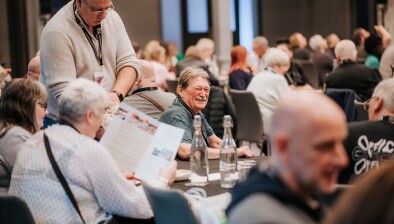Callum Chomczuk: Scottish Housing Day celebrates 10 years with a focus on communities

Callum Chomczuk
In this new blog to mark ten years of Scottish Housing Day, CIH Scotland’s national director and chair of the Scottish Housing Day 2025 steering group, Callum Chomczuk, examines some of the findings from a new report on neighbourhoods and the role that we can all play in helping to build strong communities.
Our neighbourhoods and communities affect us all and we know that across Scotland, the majority of people rate their neighbourhood as a good place to live, or indeed a very good’ place to live.
But what is it that makes people positive about their community? Is it place-based features, people-based features or is it something else?
For this year’s Scottish Housing Day, we wanted to explore what it means to be part of a good community, in Scotland today, because everybody needs good neighbours.
We know that good neighbours and strong communities can lead to positive outcomes for individuals including social support, reduced loneliness and better physical health.
However, we also know that realisation of this across the country is patchy, peoples’ experiences are not consistent and so often, the power local people have to direct change is a consequence of other organisations and agencies.
For Scottish Housing Day, we undertook a survey and workshop with housing professionals and tenants to better understand their attitudes towards their neighbours and communities.
The feedback highlights that local people are keen for connection, kindness, and convenience, but they’re equally bothered by neglect, antisocial behaviour, and community disconnection.
Respondents highly value their community, particularly the people-based characteristics and for the most part, are proud to live there. However, they also recognise that there is need for improvement, particularly to the place-based features and believe that agencies, organisations and public bodies need to work with local people to develop long term plans and improvements. The tone of the respondents to the survey and in the workshop highlighted that when frustrations are voiced, it often comes from a place of wanting things to be better, not just complaining.
Interestingly respondents report being hesitant about expecting too much from their neighbours and would be more willing to offer, rather than ask, for assistance, suggesting a lack of community confidence and trust. This lack of trust between people, and between people and organisations, is identified as the biggest barrier to improving neighbourhoods.
The need for systemic improvement was highlighted throughout the consultation as although there are many good examples of local people helping each other, there is also concern about the lack of local leadership from some local authorities, charities and agencies.
So, as we celebrate Scottish Housing Day (which marks its tenth year this year), we ask all social landlords, housing organisations, practitioners and tenants to think about the role they can play in improving neighbourliness in their local areas. The feedback is clear that people want community organisations to work with them, to build trust and improve their local areas so that everyone has good neighbours and great communities.
The report Scottish Housing Day Report: Everybody needs good neighbours is available on the CIH website.







